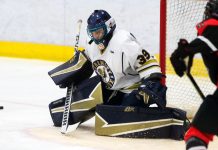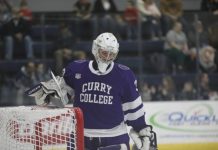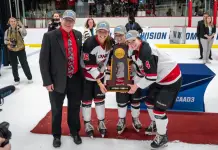Showcase Statement
Wisconsin remained the hottest team in college hockey last weekend, beating Michigan State and then-No. 1 Michigan at the College Hockey Showcase to extend its unbeaten streak to 12 games. The victories earned the Badgers, who have not lost since Oct. 8, the top spot in Monday’s USCHO.com/CSTV Networks Division I men’s poll.
The 3-1 win over the Spartans was characteristic of a veteran Badger squad, which scored three goals in the final 10 minutes of regulation to erase a 1-0 deficit. Wisconsin, which has gotten stellar goaltending from Brian Elliott (11-1-2, 1.41 GAA, .942 SV%), has not allowed more than two goals in a game all season.
Elliott has played every minute in net this season, and for his efforts last weekend was named the WCHA Player of the Week for the third time.
Saturday’s win was more of the same, as Adam Burish broke a 2-2 deadlock with the game winning goal with just 1:58 to play in the third.
“[That] is the cumulative effect of having an upperclassmen team. They have been in a lot of situations like that, so their leadership takes over naturally,” Wisconsin coach Mike Eaves said after Friday’s victory.
After a rocky first season, Eaves has led the Badgers back to national prominence. Wisconsin made the NCAA tournament for the first time in four seasons in 2004.
The Uncanny Valley
In 1970, Japanese roboticist Masahiro Mori hypothesized the concept of the “Uncanny Valley,” which postulates that human empathy towards nonhuman entities grows as the object becomes more humanlike, until a sudden drop into repulsive emotional response.
That repulsion occurs when the robot becomes sufficiently human — almost, but not quite perfect — that its remaining nonhuman peculiarities stand out, producing a sense of strangeness and dissatisfaction in human viewers.
The notion of the Uncanny Valley has been used to explain the negative, even horrified reaction of many movie critics and fans to Tom Hanks’ 2003 Christmas film “The Polar Express,” in which high-tech animation was used to create realistic characters who nevertheless looked a little off. “Creepy” was the word used repeatedly by some observers to describe the movie’s animation technique, especially the characters’ flat, lifeless eyes.
The basic point of the Uncanny Valley is that when something is almost perfect, we as observers often fail to appreciate that, and instead focus on its imperfections. So what in the world does this have to do with college hockey?
Just this: that Michigan head coach Red Berenson is trapped in college hockey’s Uncanny Valley.
Berenson, who took over the moribund Wolverines in 1984-85, rebuilt Michigan into the national powerhouse we recognize today. After a few hardscrabble years, Berenson’s Wolverines have enjoyed 18 consecutive winning seasons, 10 30-win campaigns, eight CCHA regular-season championships, seven CCHA playoff titles, an NCAA-record 15 consecutive national tournament appearances and nine Frozen Fours, including the 1996 and 1998 national titles.
Despite all of that, Berenson has never won the Spencer Penrose Award as national coach of the year. Ironically, Berenson is a former recipient of the NHL’s highest coaching honor, the Jack Adams Award, which he won with the St. Louis Blues in 1980-81.
So what gives? Recently, of course, Berenson has been the victim of his own success. The goal at Michigan is always the NCAA title, and most seasons it’s a realistic one. A coach whose team is always that good eventually falls into the trap of never being able to exceed expectations.
And it probably doesn’t help that Michigan, while among the best-loved programs in college hockey, is also among the most hated. (For college basketball’s analog, see Duke, a perpetual leader in both national merchandising and opponents’ disdain.) Michigan’s large, loud, loyal and occasionally profane fan base makes the Wolverines even easier to detest.
For that matter, who can forget 1997 Hobey Baker Memorial Award winner Brendan Morrison’s legendary crack that “the best team doesn’t always win,” coming after the favored Wolverines lost to Boston University in the national semifinals that season?
Not that I’m suggesting that the American Hockey Coaches Association, which hands out the national coaching hardware, is susceptible to that kind of thing. But it wouldn’t seem amiss for Berenson to get the accolades his success suggests. This season, despite losing both its games at the Showcase last weekend, Michigan is again highly-touted, with a 9-3-1 record and the No. 3 national ranking.
As an aside, if you haven’t read Dave Starman’s excellent piece on Berenson, “Preaching What He Practiced,” go do it now. I’ll be here when you get back.
Staying The Course
Berenson is now in his 22nd season with Michigan. Another high-profile coach, Don Lucia of Minnesota, hasn’t quite matched Berenson’s longevity, but he has equaled Berenson’s success. And it looks like he’ll be enjoying that success a while longer.
Lucia, the school announced Tuesday, has signed a contract extension through the end of the 2011-12 season. That gives the 47-year-old Grand Rapids, Minn., native another six-plus years — at least — behind the Gopher bench, which should be music to the ears of fans in the “State of Hockey.”
In 1999-2000, Lucia took over a Gopher program coming off its second straight losing season under Doug Woog. Though Woog led Minnesota to 13 straight NCAA tournament appearances, he was never able to capture a national title, something Lucia quickly corrected with back-to-back championships in his third and fourth seasons at the Gopher helm.
And after another Frozen Four appearance last April, the Gophers are on track once again for a run through the NCAAs. Minnesota picked up three points at the Showcase last weekend, battering Berenson’s Wolverines 6-3 before tying the Spartans 2-2 Saturday. That helped restore momentum to a team which had suffered through a disappointing 3-3-2 start.
Freshman phenom Phil Kessel led the way with 2-3–5 on the weekend, with both goals coming against Michigan. The return of injured Danny Irmen didn’t hurt either, as the junior scored his first two goals of the year to forge the draw with MSU.
Kessel, in particular, has lifted the No. 4 Gophers’ offense. After a bit of a slow start that saw him held off the scoreboard in three of his first five games, Kessel has 7-10–17 in the Gophers’ last nine contests and now leads the team in assists (13) and points (21).
He’s the kind of player who makes you sit up a little straighter in your seat when he has the puck, and the Gophers would do well if they can hold onto the budding star for very long. Kessel is likely to be the No. 1 overall pick in next year’s NHL draft.
The rookie forward will face a new challenge this weekend, as the Gophers host Wisconsin for a pair of games at Mariucci Arena. Kessel, as most know, is a Madison, Wis., native who spurned his hometown Badgers to sign with the Gophers during the offseason.
Spartans Sputtering
After a 5-1-1 start, the Spartans hit a depression of the type that has been only too familiar in recent seasons.
MSU is 0-5-3 in its last eight games, including a one-point performance last weekend against Wisconsin and Minnesota. That left the Spartans’ overall record at 5-6-4, and dropped them out of the national poll for the first time all year.
Most frustrating, perhaps, has been the manner in which the Spartans have been dropping decisions. During the five losses in the current winless streak, MSU scored first in four of them, and led Ohio State 2-1 in the second period in the other one.
In net, junior Dominic Vicari has watched his save percentage — a career .920 entering 2005-06 — plummet to .883 this season while splitting time with freshman Jeff Lerg. Lerg’s numbers, while better than Vicari’s, haven’t stemmed the red tide of losses for Michigan State.
On offense, MSU has gotten contributions from Lerg’s cousin, Bryan Lerg, whose two goals and 15 assists in 15 games make him the only Spartan averaging a point per game. But the Spartans haven’t found a replacement for departed senior Jim Slater, and they don’t rank among the top 20 in the nation in any major statistical category, unless you count shorthanded goals (three).
The Spartans have been to the NCAA tournament just once in head coach Rick Comley’s first three years, and though Michigan State finished each of those seasons with a winning record, that isn’t enough to keep alumni and fans happy.
Case in point: MSU won 23 games in each of Comley’s first two seasons, their best win totals during his tenure. However, the Spartans only won fewer than 23 games once in legendary head coach Ron Mason’s 21 seasons since MSU joined the fledgling CCHA in 1981-82.


